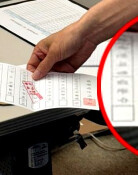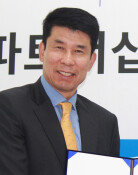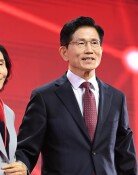Yoon’s insurrection trial casts shadow on presidential race
Yoon’s insurrection trial casts shadow on presidential race
Posted April. 22, 2025 08:17,
Updated April. 22, 2025 08:17
When former Defense Minister Kim Yong-hyun was first indicted for insurrection in connection with the Dec. 3 martial law declaration, he reportedly considered invoking the “impossibility defense.” The legal concept applies when a crime cannot occur due to an error in method or object—such as feeding someone a white powder believed to be poison, only to learn it was sugar and caused no harm. In Kim’s case, the argument seemed to be that while martial law was declared, there was no intent to infringe on civil liberties and no actual danger occurred. But once plans for military and police deployment came to light, such a defense would have been difficult to sustain—and the argument quietly disappeared.
At his first court hearing on April 14, former President Yoon Suk Yeol repeated a similar claim, saying, “Martial law was not declared to impose military rule.” Over 93 minutes, he went on the offensive, calling the indictment “nonsense” and a “comedy” as he reviewed each section of the charges. He claimed to have studied the verdict in the Chun Doo-hwan insurrection case, but his interpretation raises doubts about whether he fully understood the limits of presidential power and the legal grounds for martial law.
A closer examination of his courtroom remarks is more troubling. Yoon said he believed the impeachment of the chair of the Board of Audit and Inspection was too serious to overlook. He declared martial law under what he called emergency presidential powers, claimed the military was deployed only to maintain order, and emphasized that Cabinet meetings were unusually active beforehand. His argument mirrored the one he presented before the Constitutional Court. By making this position official in his first trial, Yoon has effectively tied his legal team’s hands going forward.
At this point, it appears he is using the courtroom as a platform for political messaging rather than focusing on his legal defense. One former politician once explained why they couldn’t abandon a weak legal argument: “The moment you admit the truth, you lose your supporters.” While no politician can survive without a base, tailoring legal strategy to political loyalty is often a fast track to downfall.
Yoon has never faced a thorough investigation into his reasons for declaring martial law. He refused to sign statements from the Corruption Investigation Office for High-ranking Officials, making them inadmissible in court. Prosecutors have speculated that the so-called Myung Tae-kyun Gate special counsel law prompted the declaration. That makes this trial the first real opportunity to determine the truth behind the order.
But a criminal courtroom is not a venue for freewheeling speeches. The defendant must respond to questions from judges and prosecutors. Under judicial oversight, Yoon’s statements will be fact-checked, falsehoods will be exposed, and every word will be broadcast.
Yoon is scheduled to stand trial at least eight more times before the June 3 presidential election. As the figure who triggered the early vote, his repeated attempts to sow distrust will keep him at the center of the race—while drawing in other campaign issues like a black hole.







